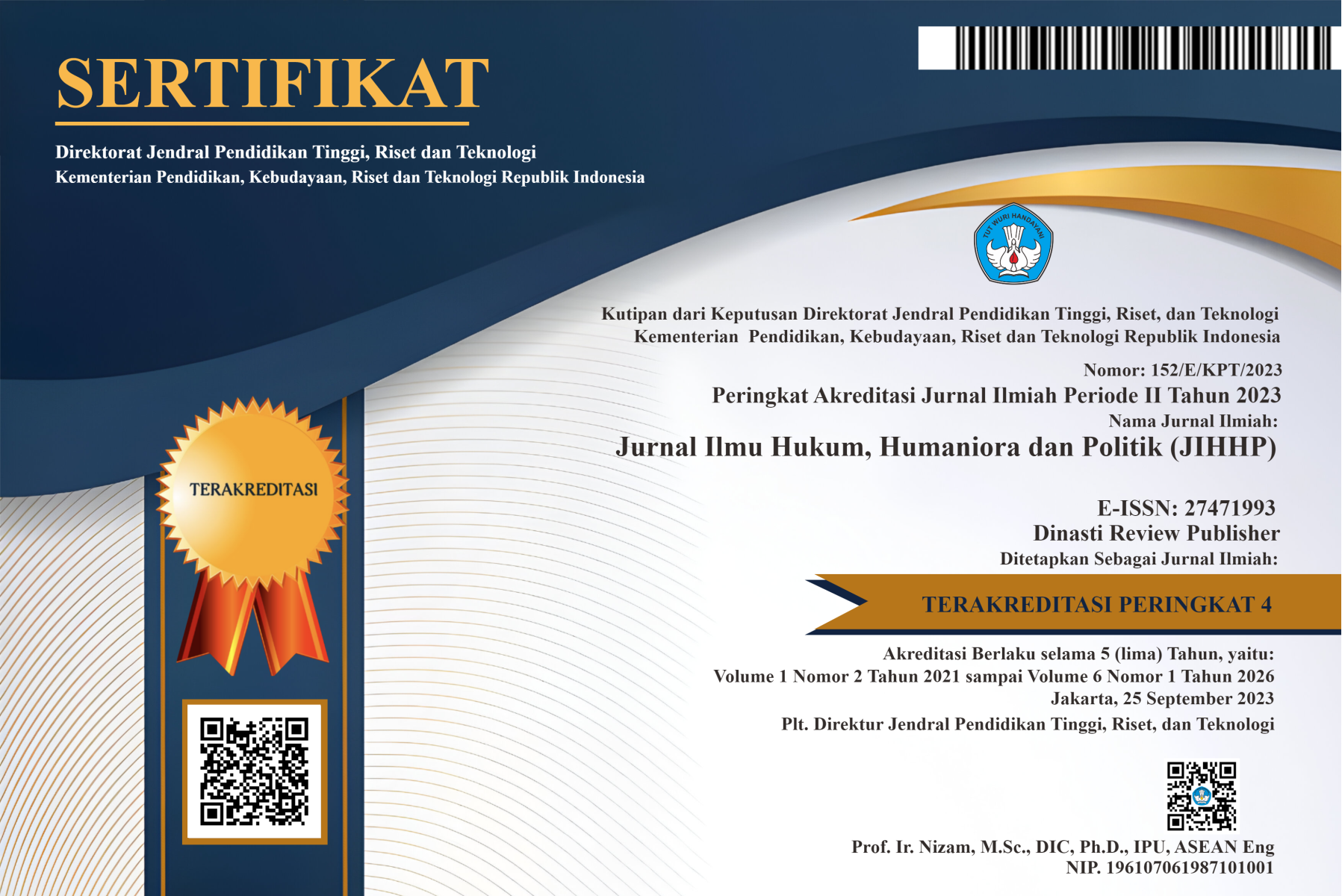Penerapan Berat Barang Bukti Sebagai Syarat Pemberian Rehabilitasi Medis Terhadap Pecandu Narkotika Analisis Putusan Tinggi Mataram Nomor:89/PID.SUS/2020/PT.MTR
DOI:
https://doi.org/10.38035/jihhp.v4i4.2237Keywords:
Narcotics, Legal protection, Legal Certainty, Medical RehabilitationAbstract
The Indonesian state is a legal state, and is not based on mere power, and every legal state definitely has a constitution and laws (laws) that regulate the running system for everything in the country. The first starts from the relationship between citizens and the second to the relationship between citizens and the State. Regulations from one of the legal studies or fields of law in Indonesia and every individual has the right to legal protection and legal certainty as stated in the law (1945 Constitution of the Unitary State of the Republic of Indonesia Article 28D paragraph 1), and One of the laws in Indonesia is Criminal Law. In Indonesia, it is a law or regulation that regulates the conditions under which a person can be punished for an act he or she commits. Criminal law in Indonesia is regulated in the Criminal Code (KUHP). And specifically regarding legal certainty in providing medical rehabilitation to narcotics addicts. From the research results, several conclusions were obtained that according to the Supreme Court Circular Letter Number 4 of 2010, that a person is a narcotics addict whose weight of evidence is below the provisions stipulated in the Circular Letter Supreme Court (SEMA) Number 4 of 2010 is obliged to undergo medical rehabilitation and this is supplemented by Article 54 of Law Number 35 of 2009 concerning Narcotics. Based on this theory, a narcotics addict is obliged and entitled to undergo medical rehabilitation.
References
Indonesia, Undang-Undang Dasar Negara Kesatuan Republik Indonesia Tahun 1945
Indonesia,Surat Edaran Mahkamah Agung Nomor 4 Tahun 2010 Tentang: Penempatan Korban Penyalahgunaan Dan Pecandu Narkotika Ke Dalam Lembaga Rehabilitasi Medis Dan Rehabilitasi Sosial
Undang-Undang Nomor 35 Tahun 2009 Tentang Narkotika, Lembaran Negara Republik Indonesia. Tahun 2009 Nomor 143, Tambahan Lembar Negara Republik Indonesia Nomor 5062
Z, Rifai, E, & Gustiniati, D. Pelaksanaan Rehabilitasi Sebagai Upaya Penanggulangan Tindak Pidana Narkotika (Studi Pada Loka Rehabilitasi Kalianda). Jurnal Poenale. hal35.
Adi Kusno, Diversi Sebagai Upaya Alternatif Penanggulangan Tindak Pidana Narkotika Oleh Anak, (Malang: UMM Press, 2009).
Manullang E. Fernando M, Menggapai Hukum Berkeadilan: Tinjauan Hukum Kodrat dan Antinomi Nilai, (Jakarta: PT Kompas Media Nusantara, 2007).
Mertokusumo Soedikno, Mengenal Hukum: Suatu Pengantar, Edisi Revisi, (Yogyakarta: Cahaya Atma Pustaka, 2010),
Sudarto, Hukum Pidana,(Semarang:Yayasan Sudarto Fakultas Hukum Universitas Diponegoro 1990).
Nasution Muhammad Syukuri Albani, Hukum Dalam Pendekatan Filsafat,( Jakarta: Kencana, 2017),
Downloads
Published
How to Cite
Issue
Section
License
Copyright (c) 2024 Marsel Mulyadi, Ade Adhari

This work is licensed under a Creative Commons Attribution 4.0 International License.
Hak cipta :
Penulis yang mempublikasikan manuskripnya di jurnal ini menyetujui ketentuan berikut:
- Hak cipta pada setiap artikel adalah milik penulis.
- Penulis mengakui bahwa Jurnal Ilmu Hukum, Humaniora dan Politik (JIHHP) berhak menjadi yang pertama menerbitkan dengan lisensi Creative Commons Attribution 4.0 International (Attribution 4.0 International CC BY 4.0) .
- Penulis dapat mengirimkan artikel secara terpisah, mengatur distribusi non-eksklusif manuskrip yang telah diterbitkan dalam jurnal ini ke versi lain (misalnya, dikirim ke repositori institusi penulis, publikasi ke dalam buku, dll.), dengan mengakui bahwa manuskrip telah diterbitkan pertama kali di JIHHP.
















































